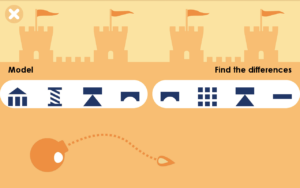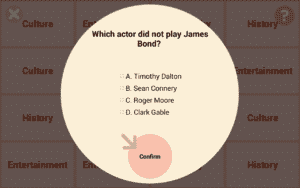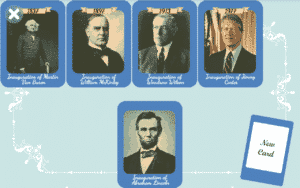Caregivers facing Alzheimer’s : the tablet a simple and practical tool
Here is our guide of use and support for family caregivers using the tablet and our memory games with their elderly relative . The games are both suitable for people with limited cognitive disorders or unfortunately for people with Alzheimer’s disease, dementia, at a moderate to severe stage . These memory exercises on tablet allow you to play together to simple and adapted games, to share a good time but also to support and help your loved one to maintain its cognitive function , and autonomy.
The tablet , a mediation for a family caregiver
Often it is difficult for family caregivers caring for a loved one with Alzheimer’s disease continue to enjoy activities together. Your loved one can no longer do the activities , and a cold can be installed when you visit your loved one at home or in nursing homes, because it often appears that the subjects of conversations are circling and silence is heavy.
In addition, by the game it is easier to convey emotion , and the aim is also to share a good time together , have fun, while training its memory and cognitive functions.
Thus, the tablet appears as a formidable mediation and communication tool, and fits perfectly to enhance the life of a dependent person. Here are our tips for using the tablet and Stim’Art memory games with your help.
1) Desecrate the tablet
First reactions to the sight of the touch pad are often negative for elders, because they have never seen it and are afraid of not succeeding. You will often hear: “new technologies for seniors? too little for me. ” But curiosity takes over and seniors are quickly mastering the tool, because you just have to put your finger on the screen and it moves: this has a “magical” side.
We worked the ergonomics of our Stim’art memory games for seniors, including Scarlett version, with care homes, in order to adapt usability expectations and capabilities : the app is very relaxing with pastel colors and high contrast for better visibility, there are very few buttons and possible actions, and finally we have established comfort zones (with very large font sizes, zoom in / zoom out with buttons).
The games are so simple to use that an elder with Alzheimer ‘s disease succeeds in using it . The format is convenient because the elder can easily play from their armchairs , their couch or bed : the tablet carries very easily, and since the games run without wifi, it will be easier for them to practice anywhere, with any caregiver !
It is important that as a caregiver you accompany your loveone from the begining, to reassure him about his ability to handle the tablet, emphasizing the fact that you will accompany him and you will do it together.
2) Do it together : the importance of sharing
The accompaniment is the key to success for your loved one to handle the tablet by his own, it is even necessary . This allows at first to be reassured, from its cognitive or physical disabilities , but also to create links , and so put aside the stresses of everyday life that are related to dementia and memory loss. Through play, we play , and we play together. Your loved one will not always be able to express his gratitude to his caregivers, but a smile during a game, a laugh , is also a great recognition.
3 ) Be patient
The accompaniment is the key to success certainly, and it must remain benevolent. In fact , learning is often based on demonstration and performance , which is critical on the fact that this is a new technology for their generation. The handling can be learned more easily accompanied by a relative who will be there to show , but also be patient, and does not judge if the first time is difficult (although we were surprised how quickly some seniors, that have never seen a tablet to succeed in one session ) .
Finally … the key is to participate ! Playing together is anything but a race for success : it is a time for sharing , and a respite to focus on the ties that bind you . The goal here is to accept the other as he is and be his playing partner . This requires focusing on this moment of pleasure and thus recreating a positive environment in the care relationship .
4 ) Talking and listening : avoid the failure
Throughout the games, it is important to never put your loved one by default, and to make him understand that if he don’t succeed, it does not matter , the important thing is to have fun playing . In addition, our memory games were designed to avoid the failure , and the games always end with a “Well done” . You might think this is symbolic , but it makes the fun part , we do not judge , and we did the test: putting too much time on the wrong answers , the senior did not want to play games anymore. Saying simply “well played !” every time, people with Alzheimer’s disease continue to play for hours and have fun , and it is ultimately the most important.
5) A progressive approach adapted to the disease
In order not to put your loved one by default, and provide the best support , we recommend that you start with the easiest memory games, and therefore to follow this order .
The easiest access memory games to play alone are:
- Bubbles , when it comes to connect the numbers in ascending order. This game is also the favorite game of people with Alzheimer’s disease at a moderate to severe level ( Study conducted on 100 care homes).
- Hunting intruders , in the easy level , where you have 4 words and you must find the intruder.
- Brain Storm , when it comes to reconstruct the famous sayings,
- Musical Ear , where you have to recognizE the sounds of everyday life or animals,
- Bouncing Ball , when it comes to catching a tennis ball that wanders onto the screen.
Then , depending on the success of your loved one , you can gradually discover new games , a little more complex , such as:
- ColorMind where there are color combinations to reproduce, making work the working memory,
- Crazy waterfall, where there are symbols and you have to check the differences , using the attention and executive functions,
- Puzzle Plus, which uses fine motor skills, recomposing puzzles of famous paintings .

Some more cultural games are a very good support to play together, to strengthen the ties that bind you :
- Quiz USA , where you will find the general knowledge questions,
- A Card A Date, when you have to place the events on a chronological order,
- A text a Day, where you discover everyday a new text from the American-English litterature.


Despite their cultural aspect, these games are as much a work of attention, executives functions, the implementation strategy …
6) The expected effects
The games will have several effects on several dimensions :
– Pleasure dimension : Pleasure is the greatest feeling. The disease might be present , our seniors still have desires and wishes, desire to share , to laugh and have a good time . The games also make use of old memories , they have experienced during their childhood , be it paintings by Monet , Van Gogh, and then a song of Edith Piaf and Maurice Chevalier , and memories of Children always move them.
– Cognitive stimulation dimension : memory games were made with neuropsychologists to work the various memory functions : attention , executives functions, visuospatial memory, language , etc. These are all features that will be stimulated during game sessions on the tablet.

